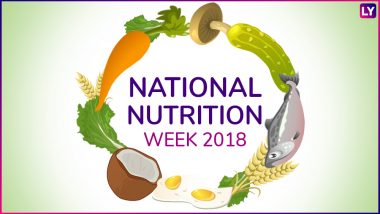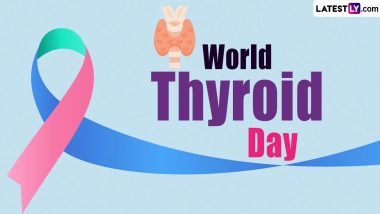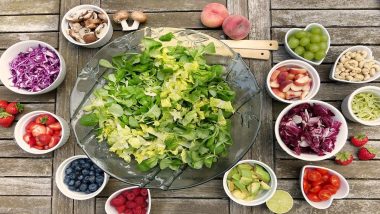To stay healthy, we have to eat healthful foods. But what is the definition of healthful anyway? We are now facing an information overload on how to eat and what to eat. The influx of fad diets and contradicting studies have been adding to the confusion. For 5,000 years, Indians have believed that coconut oil is a treasure trove of nutrition. And now, after a Harvard professor called it ‘pure poison,’ our faith in ancient wisdom has been tested. Keto diet has been proving that fats are our friends and not enemies. It’s the carbs that we should be suspicious of. However, almost all studies suggest that to stay healthy, one should eat nutrient-rich foods like unsaturated fats, whole grains, good proteins, fruits and vegetables while limiting trans and saturated fats, refined grains and sugary beverages. On National Nutrition Week, let’s count all the ways in which we can stay healthy.
1. Chose Healthy Fats Over Good Fats
Fats are a misunderstood food group. We are led to believe that all fats are bad and should be shunned completely. Fear of fats have led us straight to calorie-dense foods loaded with sugars. But there are four types of fats, all of which have different effects on our health.
Trans fats are largely man-made fats found in processed foods, which are bad for overall health since they elevate harmful cholesterol and stimulate inflammation in the body.
Saturated fats from meat and dairy can increase the risk of the harmful LDL cholesterol but they also raise the good cholesterol. Studies recommend having a moderate consumption of saturated fats. Cheese and butter for weight loss?
Monosaturated and polyunsaturated fats from vegetable oils, nuts, fish and grains are good for you. Daily consumption of these fats help you elevate good cholesterol, lower bad cholesterol, improve insulin sensitivity and regulates your heart beats.
2. Have Whole Grains For Carbohydrates
Fear of fats has pushed people to eat more carbs. But instead of eating healthy whole grains, the world turned towards refined, bleached ones. White rice replaced brown rice and white flour replaced whole grains. Consuming processed grains can increase triglycerides and blood sugar, and reduce good cholesterol.
It can also increase the risk of type 2 diabetes and coronary artery diseases. That’s why, consuming whole grains as part of your healthy diet gives you your daily requirement of fibre, vitamins, minerals and phytonutrients.
In a nutshell, choose carbs that get digested slowly instead of those that get digested fast. Ban white rice, white flour, pastries and sugar out of your life! Instead turn to whole grains such as brown rice, quinoa, wheat, beans and nuts for your carbs. Study says you need at least six servings of whole grains every day!
3. Eat More Protein Derived From Plants
Proteins are the building blocks of life. It helps you build lean muscles mass; gives you healthy hair, skin and nails; and keeps you fuller for longer. It helps in the wear and tear of the body. Although it doesn’t matter to your body where the proteins come from – animal or plant – evidence suggests that plant proteins are better packed with additional nutrients.
Study results from the Nurses’ Health Study say that eating more protein from plant sources like beans, nuts and seeds and limiting easily-digested grains reduced heart risks. Having more plant protein gives you a host of other nutrients like a good amount of fats, carbohydrates, sodium, etc., which helps improve your health. Olive oil is said to work better than Viagra!
Be flexible when it comes to proteins. Have most of your proteins from plants and small amounts from meat, eggs, fish and dairy. Two servings of fish per week is good for health.
4. Eat 5 Servings of Brightly-Coloured Vegetables and Fruits
From childhood, we’ve heard elders say, "Finish the veggies on your plate." Not much has changed ever since. Vegetables and fruits still reign supreme when it comes to nutrition. Have at least five servings of fruit and vegetables daily. Have a serving dark green leafy vegetable at least once a day. A yellow or orange fruit or vegetable, a red fruit and a citrus fruit each day will keep the doctor away. And don’t fall for the allure of exotic fruits when local ones will do just as well!
5. Low-Calorie Drinks Are The Best
When it comes to beverages, lower the calories the better. There’s no better beverage than water for washing your food down. It hydrates, it’s low in calories and helps in digestion.
Coffee and tea in moderation with little or no amount of milk and sugar are actually good for your health! And skimmed milk or low-fat milk should be preferred in the place of full-fat ones.
And as always, sugary beverages, sodas, fruit juices and sports drinks should be limited. Alcohol was believed to be good for health in moderation, but a new Lancet study claims that no amount of alcohol can be good.
(References:Essentials of Healthy Eating: A Guide)
(The above story first appeared on LatestLY on Aug 30, 2018 08:13 PM IST. For more news and updates on politics, world, sports, entertainment and lifestyle, log on to our website latestly.com).













 Quickly
Quickly





















